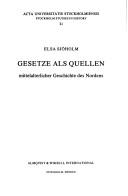| Listing 1 - 10 of 299 | << page >> |
Sort by
|
Book
ISBN: 113934367X 1108051650 Year: 1878 Publisher: Place of publication not identified : Cambridge : publisher not identified, Cambridge University Press
Abstract | Keywords | Export | Availability | Bookmark
 Loading...
Loading...Choose an application
- Reference Manager
- EndNote
- RefWorks (Direct export to RefWorks)
The thirteenth-century Latin legal treatise best known as Bracton is now thought to be the work of several hands, and Henry de Bracton (d.1268) to have been only the last of these. Work began on it in the 1230s and largely ceased in the early 1250s, but the treatise - an ambitious survey of English law - was never finished. Between 1878 and 1883, the scholar and jurist Sir Travers Twiss (1809-97) edited and published this work in six volumes for the Rolls Series. His text was mainly based on the first printed edition of 1569. Although he provided the first English translation of Bracton, Twiss's work has been criticised and since superseded. Volume 1 contains Book 1 and most of Book 2. These include the general introduction, the law of persons and most of the law of things.
Law --- Law, Medieval --- Medieval law
Book
ISBN: 128054483X 9786610544837 184615071X Year: 2001 Publisher: Woodbridge : Boydell Press,
Abstract | Keywords | Export | Availability | Bookmark
 Loading...
Loading...Choose an application
- Reference Manager
- EndNote
- RefWorks (Direct export to RefWorks)
The first systematic examination of the expectations people had of the law in the middle ages. This book represents the first systematic examination of the expectations people had of the law in the Middle Ages. Up until now historians have used medieval legal records to demonstrate the operation of legal rules, the functioning of legal institutions and the development of the legal profession, but they have rarely considered the attitudes that arose as a result of the processes of law. The papers in this volume investigate the way expectations of the law were generated, captured, revealed or replayed for posterity in medieval Europe in jurisprudential reasoning, the activity of charter writing, the framing of definitions of "liberty", the concern for historical justifications, and the phraseology of various forms of legislation and chancery bills. Attitudes and perceptions are also considered with regard to the active role played by rulers of European states in law-giving and in the organisation of legal institutions. Contextualising some of the developments in medieval law, this volume not only enables generalisations to be made about expectations of the law, but also highlights the existence of national and supra-national similarities as well as differences arising in medieval Europe. Contributors: RICHARD W. KAEUPER, D. HEIRBAUT, M. KORPIOLA, JUDITH EVERARD, CYNTHIA J. NEVILLE, JULIA C. CRICK, H. SUMMERSON, G. SEABOURNE, G. DODD, T. HASKETT, ANTHONY MUSSON, C. STEBBINGS, P. TUCKER.
Law, Medieval. --- Law --- History. --- Medieval law
Book
ISBN: 8878311103 Year: 2000 Publisher: Rome : Il Cigno galileo galilei,
Abstract | Keywords | Export | Availability | Bookmark
 Loading...
Loading...Choose an application
- Reference Manager
- EndNote
- RefWorks (Direct export to RefWorks)
Law, Medieval --- Questioning --- Interrogation --- Socratic method --- Catechetics --- Teaching --- Medieval law

ISBN: 3110096072 3111762580 3110854325 Year: 2013 Volume: Bd. 12 Publisher: Berlin ; Boston : De Gruyter,
Abstract | Keywords | Export | Availability | Bookmark
 Loading...
Loading...Choose an application
- Reference Manager
- EndNote
- RefWorks (Direct export to RefWorks)
Medicine, Medieval. --- Law, Medieval --- Medicine, Medieval --- Medieval medicine --- Medieval law
Book
ISBN: 9781405152945 Year: 2010 Publisher: Chichester Wiley-Blackwell
Abstract | Keywords | Export | Availability | Bookmark
 Loading...
Loading...Choose an application
- Reference Manager
- EndNote
- RefWorks (Direct export to RefWorks)
Law --- Law, Medieval. --- History --- Law, Medieval --- Medieval law
Periodical
Abstract | Keywords | Export | Availability | Bookmark
 Loading...
Loading...Choose an application
- Reference Manager
- EndNote
- RefWorks (Direct export to RefWorks)
Law --- General and Others --- medieval law --- canon law --- history of law --- common law
Book
ISBN: 0691030847 9786613101907 1400820472 1283101904 9781400820474 9780691030845 9781283101905 6613101907 Year: 2011 Publisher: Princeton, NJ
Abstract | Keywords | Export | Availability | Bookmark
 Loading...
Loading...Choose an application
- Reference Manager
- EndNote
- RefWorks (Direct export to RefWorks)
From the point of view of economic history, the ideal way to study any institution of commercial law would be to compare the information contained in legal codes and treatises with the material relating to its application in economic life as manifested by actual contracts, letters, and business records found in archives and other repositories. In the case of the early centuries of the Islamic period, available sources unfortunately preclude such a procedure. Theoretical legal texts exist in abundance, but any corresponding documentary material is for all practical purposes non-extant. In order to determine if the framework in which the trade and commerce of the early Islamic period was carried on--a trade known to have been active and important--we must of necessity rely on legal treatises for most of our information, which trying wherever possible to call upon whatever meager help other literary sources may provide. In the absence of documentary and similar sources, the possibility of investigating the quantitative aspects of trade is all but eliminated. However, in those areas of trade which have been described as qualitative, such as the variety of goods exchanged, the specialization of the merchant class, and the complexity of business methods, legal and other literary sources provide a great deal of valuable information. It is with the institutions of partnership and commends in the early Islamic period, two of the qualitative components of trade, that Abraham L. Udovitch makes his primary focus in Partnership and Profit in Medieval Islam.
Law, Medieval. --- Partnership (Islamic law). --- Partnership (Islamic law) --- Medieval law --- Islamic law

ISBN: 9122000917 Year: 1977 Publisher: Stockholm Almqvist och Wiksell International
Abstract | Keywords | Export | Availability | Bookmark
 Loading...
Loading...Choose an application
- Reference Manager
- EndNote
- RefWorks (Direct export to RefWorks)
Law, Germanic --- Law, Medieval --- Medieval law --- Germanic law --- Law, Germanic. --- Law, Medieval.
Book
ISBN: 194240168X 9781942401681 1641899107 1942401701 1942401698 9781942401698 Year: 2018 Publisher: Kalamazoo Arc Humanities Press
Abstract | Keywords | Export | Availability | Bookmark
 Loading...
Loading...Choose an application
- Reference Manager
- EndNote
- RefWorks (Direct export to RefWorks)
Canon law is an unavoidable theme for medieval historians. It intersects with every aspect of medieval life and society, and at one point or another, every medievalist works on the law. In this book, Kriston Rennie looks at the early medieval origins and development of canon law though a social history framework, with a view to making sense of a rich and complex legal system and culture, and an equally rich scholarly tradition. It was in the early Middle Ages that the ancient traditions, norms, customs, and rationale of the Church were shaped into legislative procedure. The structures and rationale behind the law's formulation - its fundamental purpose, reason for existence and proliferation, and methods of creation and collection - explain how the medieval Church and society was influenced and controlled. They also, as this short book argues, explain how it ultimately functioned.
Canon law --- Law, Medieval. --- History. --- Medieval law --- Roman Church. --- canon law. --- medieval.
Book
ISBN: 1783748176 178374815X 1783748168 Year: 2020 Publisher: Cambridge : Open Book Publishers,
Abstract | Keywords | Export | Availability | Bookmark
 Loading...
Loading...Choose an application
- Reference Manager
- EndNote
- RefWorks (Direct export to RefWorks)
This volume is an indispensable resource for scholars and students of medieval Scandinavia. This polyglot dictionary draws on the vast and vibrant range of vernacular legal terminology found in medieval Scandinavian texts - terminology which yields valuable insights into the quotidian realities of crime and retribution; the processes, application and execution of laws; and the cultural and societal concerns underlying the development and promulgation of such laws.
Scandinavian languages. --- Law, Medieval. --- Medieval law --- Nordic languages --- Norse languages --- North Germanic languages --- Germanic languages
| Listing 1 - 10 of 299 | << page >> |
Sort by
|

 Search
Search Feedback
Feedback About UniCat
About UniCat  Help
Help News
News